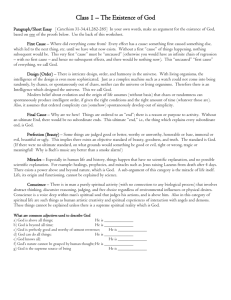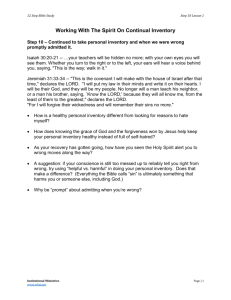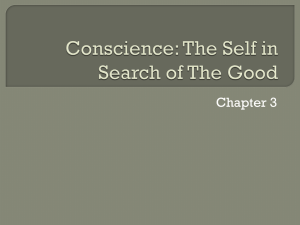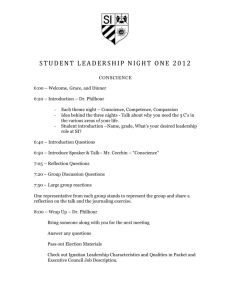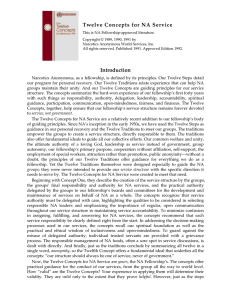NA Group Area Region Zone Inventory based on the 12 Concepts of
advertisement
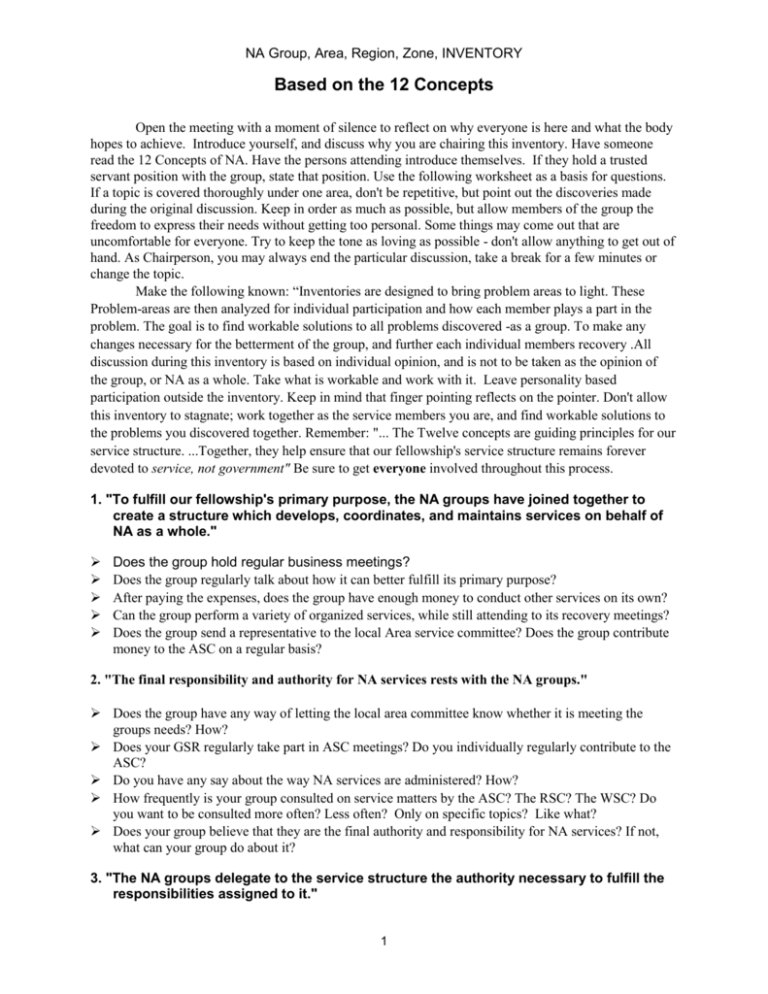
NA Group, Area, Region, Zone, INVENTORY Based on the 12 Concepts Open the meeting with a moment of silence to reflect on why everyone is here and what the body hopes to achieve. Introduce yourself, and discuss why you are chairing this inventory. Have someone read the 12 Concepts of NA. Have the persons attending introduce themselves. If they hold a trusted servant position with the group, state that position. Use the following worksheet as a basis for questions. If a topic is covered thoroughly under one area, don't be repetitive, but point out the discoveries made during the original discussion. Keep in order as much as possible, but allow members of the group the freedom to express their needs without getting too personal. Some things may come out that are uncomfortable for everyone. Try to keep the tone as loving as possible - don't allow anything to get out of hand. As Chairperson, you may always end the particular discussion, take a break for a few minutes or change the topic. Make the following known: “Inventories are designed to bring problem areas to light. These Problem-areas are then analyzed for individual participation and how each member plays a part in the problem. The goal is to find workable solutions to all problems discovered -as a group. To make any changes necessary for the betterment of the group, and further each individual members recovery .All discussion during this inventory is based on individual opinion, and is not to be taken as the opinion of the group, or NA as a whole. Take what is workable and work with it. Leave personality based participation outside the inventory. Keep in mind that finger pointing reflects on the pointer. Don't allow this inventory to stagnate; work together as the service members you are, and find workable solutions to the problems you discovered together. Remember: "... The Twelve concepts are guiding principles for our service structure. ...Together, they help ensure that our fellowship's service structure remains forever devoted to service, not government" Be sure to get everyone involved throughout this process. 1. "To fulfill our fellowship's primary purpose, the NA groups have joined together to create a structure which develops, coordinates, and maintains services on behalf of NA as a whole." Does the group hold regular business meetings? Does the group regularly talk about how it can better fulfill its primary purpose? After paying the expenses, does the group have enough money to conduct other services on its own? Can the group perform a variety of organized services, while still attending to its recovery meetings? Does the group send a representative to the local Area service committee? Does the group contribute money to the ASC on a regular basis? 2. "The final responsibility and authority for NA services rests with the NA groups." Does the group have any way of letting the local area committee know whether it is meeting the groups needs? How? Does your GSR regularly take part in ASC meetings? Do you individually regularly contribute to the ASC? Do you have any say about the way NA services are administered? How? How frequently is your group consulted on service matters by the ASC? The RSC? The WSC? Do you want to be consulted more often? Less often? Only on specific topics? Like what? Does your group believe that they are the final authority and responsibility for NA services? If not, what can your group do about it? 3. "The NA groups delegate to the service structure the authority necessary to fulfill the responsibilities assigned to it." 1 What does your group think about the concept of delegated authority? If your group were consulted on every decision that had to be made by every service board, committee, or subcommittee at the area, regional, and world level, would you still have enough time and energy to address your own group's business? Would your group have enough information to be able to offer intelligent advice on such matters? If we as addicts are "miss-manager and not capable of consistently making good decisions" (BT; p.60}, how can we responsibly delegate to our trusted servants the kind of authority called for in the 3rd Concept? 4. "Effective leadership is highly valued in Narcotics Anonymous. Leadership qualities should be carefully considered when selecting trusted servants." Does NA have leaders? If so, what kind of leaders? Does a fellowship that makes collective decisions need leaders? Does your group have leaders? If so, who are they? In what sense can they be called "leaders"? Could your group do without leaders? Could a service board or committee do without leaders? What are the skills and personal traits we seek when selecting trusted servants? What is the real foundation of NA leadership? Does this group allow a rotation of leadership? How often? What does NA leadership have to do with recovery? With selfless service? 5. "For each responsibility assigned to the service structure, a single point of decision and accountability should be clearly defined." Does the group assign particular tasks to particular people? Does this help ensure that important jobs actually get done? Does anyone in the group know of a situation where more than one person or subcommittee was given responsibility for the same task? What happened? If three different people are all given equal authority in a particular service matter and the work is not done, who is held accountable? 6. "Group conscience is the spiritual means by which we invite a loving God to influence our decisions." What do we mean when we say that NA is a spiritual society? Does a spiritual society approach the decision-making process differently than other organizations? Is "group conscience" just NA 's way of saying "voting"? In what way is group conscience distinct from our decision-making processes? In what way is group conscience a fundamental part of that process? How does the practice of the 6th Concept help us focus on "principles, not personalities" (12th Tradition} when we make service decisions. Besides decision making, in what other areas of our lives can we see group conscience at work? 7. " All members of a service body bear substantial responsibility for that body's decisions and should be allowed to fully participate in its decision-making processes." Who participates in your group's business meetings? Why? Do all the members of the group bear substantial responsibility for the NA services delivered? Do all members of a particular subcommittee bear substantial responsibility for that subcommittee's work? Are there any differences in the way members participate in service committee meetings and in a subcommittee meeting? Why, or why not? 2 8. "Our service structure depends on the integrity and effectiveness of our communications." How does regular communication support the 2nd Concept? The 3rd Concept? The 4th Concept? The 6th Concept? How could alack of regular communication undermine those concepts, and the integrity and effectiveness of our service structure? Does the group receive regular communication from the trusted servants, service boards, and committees that serve it? Does the group regularly communicate with those trusted servants, service boards, and committees? How has this communication -or lack of it affected your group? The service structure? How can it be improved? 9. "All elements of our service structure have the responsibility to carefully consider all viewpoints in their decision-making processes." Why is it important to make sure all viewpoints are considered when making service decisions? How can an individual member voice his or her viewpoint on a service decision at hand? In your group? Area? Region? Do NA services make the effort they should to seek out new, different viewpoints? How do you know when it's time to speak up against a decision of the majority? When it's time to accept a decision and surrender to group conscience? 10. "Any member of a service body can petition that body for the redress of a personal grievance, without fear of reprisal." Do you know of anyone who has been wronged in service? Has that wrong been made right? How? Have you ever been afraid to speak your conscience in service meetings? Do you know of anyone who has been afraid to speak freely? If so, why? When is it appropriate to apply the l0th Concept? When is it not appropriate? 11. "NA funds are to be used to further our primary purpose, and must be managed responsibly." What is money used for in your group? Does your group have standing budget priorities, or does it handle finances month-to-month? Do you know of instances where NA money has been spent frivolously at the group level? What was "frivolous" about the way that money was spent? How should it have been spent instead? Are NA funds well accounted for in your group? If not, what kinds of financial reports would you like to see instead? Does your group depend on NA fund-raisers for a significant portion of its income? Is that wise? How does it affect your groups relationship to the area? 12. "In keeping with the spiritual nature of Narcotics Anonymous, our structure should always be one of service, never of government." What is the difference between service and government? What is it about NA's primary purpose and its spiritual identity that says "our structure should always be one of service, never of government?" What spiritual concepts are utilized in our service structure? In government? Is your groups service structure one of service, or one of government? 3 This concludes the question part of the Inventory. Be sure that each person has had a part in the discussion. Go around the room and ask each person what they feel has been discovered during this inventory, how they feel about the discoveries, and what solutions they have. Be sure to thank each person who attended, and close in the usual manner of the group. 4

